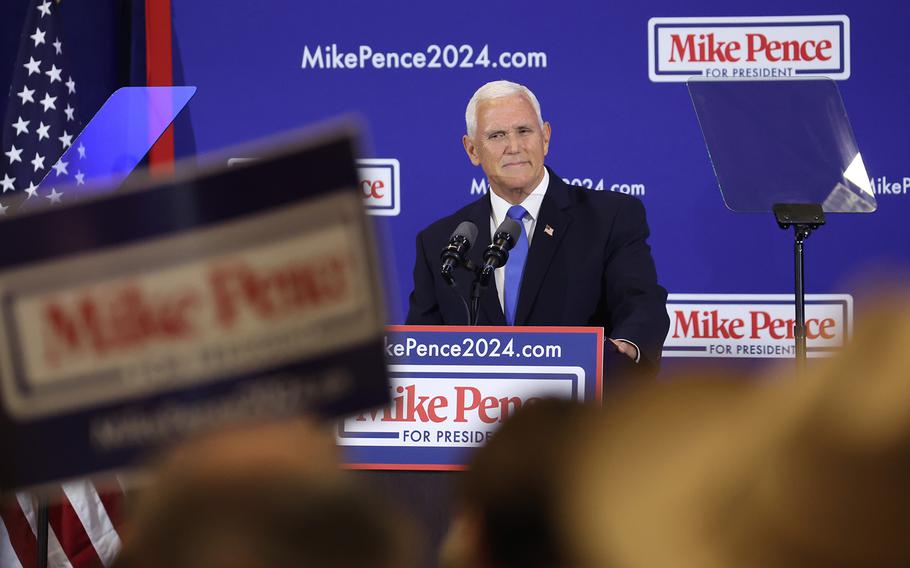
Former Vice President Mike Pence speaks to supporters as he formally announces his intention to seek the Republican nomination for president on June 7, 2023, in Ankeny, Iowa. (Scott Olson, Getty Images/TNS)
(Tribune News Service) — Win one as the Gipper? Good luck with that.
Last week the Republican field for the presidency took near-final form, and it became clear that among Donald Trump’s suddenly expanded number of rivals, some are modeling themselves to varying degrees on that other former president, Ronald Reagan. That strategy is a way of breaking, if only implicitly, with Trump and Trumpism: going back to the future by invoking the most beloved of modern presidents among Republicans.
Of all the announced candidates, none is more overt about embracing Reagan over Trump than Trump’s once-obsequious vice president, Mike Pence. At 64, Pence is among the older Trump challengers in the bunch, old enough for Reagan to have been a formative influence for him in real time — as Pence recounted in his presidential announcement in Iowa on Wednesday.
He started in politics as a Democrat, Pence told his assembled supporters. “But I’ve got to tell ya — as soon as I heard the voice of the 40th president of the United States, I joined the Reagan revolution and never looked back.”
He punched those final words for emphasis. Yet even in his friendly audience, the applause was merely polite.
That’s a telling response. It suggests the very real limits of donning the Reagan mantle, whether for Pence, former Arkansas Gov. Asa Hutchinson, former South Carolina Gov. and United Nations Ambassador Nikki Haley, or last week’s other two new entrants in the contest, former New Jersey Gov. Chris Christie and second-term North Dakota Gov. Doug Burgum.
Reagan, the self-styled optimist who expanded the Republican Party’s appeal even as he turned it rightward in the 1980s, is an increasingly faded memory for voters; he left office nearly 35 years ago and soon disappeared from public view, diagnosed with Alzheimer’s disease. He died two decades ago.
Invocations of his name and legacy may have animated Republicans once, but now the Gipper can’t win it for anybody.
Today’s Republican Party is the Trump Party. Even many of its voters who aren’t solidly MAGAfied nonetheless want Trump in 2024 or — if they’ve tired of his maniacal dramas and legal morass — someone like him, just without so much baggage.
So far, Florida Gov. Ron DeSantis has dominated that lane. Yes, as governor he did once declare Feb. 6, the 40th president’s birthday, as Ronald Reagan Day in Florida. But as a presidential candidate, DeSantis is trying to out-Trump Trump — in the right-wing culture wars, with anti-immigration stunts and by populist attacks on iconic corporations — seemingly without regard to how that performance would damage him for the general election, should he win the Republican nomination.
Hutchinson once joked to Washington journalists at an annual dinner of their Gridiron Club that for DeSantis to challenge Trump would mark the first time a father and son have ever opposed each other for the presidency. Mini-Me DeSantis does share Trump’s superpower — shamelessness — and a zeal for punching back and punching down, though he’s only lately starting to do so against the former president.
The potency of Trumpism is evident in the party: Together, Trump and DeSantis have backing from three-quarters of Republican voters, though DeSantis has slid behind the former president in the polling by roughly 30 percentage points on average. Still, he remains Trump’s only rival whose party support is in double digits.
Republican voters, those who participate in primaries and caucuses, aren’t looking for a return to Reagan’s trademark sunny optimism and talk of America as the “shining city on the hill.” Even before Trump (think Newt Gingrich, and the tea party movement), these voters were looking for scrappers whose rhetoric leaned more toward “American carnage” and who validated the voters’ grievances against the elites. Trump just took the pugilism up a notch — OK, many notches — and they were hooked.
Differences between Reaganism and Trumpism aren’t just ones of style and rhetoric. They’re substantive, which also works against those who would be Reagan redux.
There’s overlap between the -isms, mainly in favoring tax cuts and deregulation. But Reagan’s defining policies also included some that are now all but anathema in the Trump Party: He was pro-immigration; the landmark 1986 law he signed included amnesty for millions of undocumented immigrants. He was for free trade, not protectionism. He was anti-communist and condemned the then-Soviet Union as an evil empire — as Pence and Haley have suggested, Reagan would surely have opposed Russia’s invasion of Ukraine and supported U.S. assistance to the defenders.
On Wednesday, Pence, reflecting his Reaganist bent, slammed Trump and DeSantis, too, for being willing to forfeit American leadership on the world stage and to coddle dictators such as Vladimir Putin. Yet he has to know that muscular internationalism is increasingly unpopular among his would-be voters. They flock behind Trump’s isolationist “America First” banner. The intraparty tension is evident in Congress, where Republicans are split over further aid to Ukraine.
When candidates for president are mired in single digits in the polls, it can’t hurt for them to wrap themselves in the mantle of a party icon. But it won’t help them either. Reaganism is the past. The Republican Party shows no signs of going back — and certainly not in time for the 2024 primaries.
Jackie Calmes is an opinion columnist for the Los Angeles Times in Washington.
©2023 Los Angeles Times.
Visit at latimes.com.
Distributed by Tribune Content Agency, LLC.